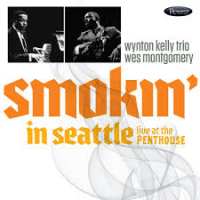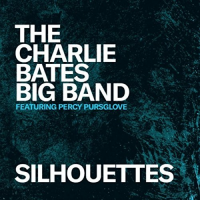Home » Jazz Articles » Album Review » Wes Montgomery with the Wynton Kelly Trio: Smokin’ in Se...
Wes Montgomery with the Wynton Kelly Trio: Smokin’ in Seattle: Live at the Penthouse (1966)
"No style of art can remain static: irrelevance is just as much a risk as the inevitable decadence that comes from a style developing to its last measure. But fans, including critics, of particular movements of artists, tend to want what they love to stay the same, the regression is not to the mean but to an Edenic past that never actually existed."
Written with the present in mind, Grella's point is easily transmuted to any particular era one likes from any vantage point in the future. I favor acoustic, small group jazz made between 1945 and 1965, a predilection that continues 50 years later. The beauty of appreciation is that it can occur vertically and horizontally. Vertically, we can experience and appreciate the evolution of an art form from its genesis until the now. Anywhere along the way up we can stop and view the horizontal: everything occurring, on all sides, at a single point in time. This appreciation does not interfere with the vertical experience but does add to its breadth.
It is in this horizontal appreciation of jazz that previously unheard, archival performances are so important. They add depth to the perspective. Such is the case with Wes Montgomery's Smokin' in Seattle: Live at the Penthouse (1966), with the Wynton Kelly Trio. In the mid-1960s, before rock music completely took over, Montgomery was considered something special. From our present vantage point looking back, Montgomery's Smokin' at the Half Note (Verve, 1965), also with Kelly's trio, is considered one of the finest live jazz recordings of any period. It would be only natural to want to experience more of this type of music from the period.
This particular trio was also the rhythm section for Miles Davis' band between 1959 and 1963, with pianist Kelly, bassist Paul Chambers and drummer Jimmy Cobb. The significance of this rhythm section is that they were on-hand during the fertile, transformative period between Davis' two great quintets, anchoring the recording of Davis' greatest achievement, Kind of Blue (Columbia, 1959).
Until now, Full House (Riverside, 1962) was the only other recording that Montgomery made with the Wynton Kelly Trio, and served as a prelude to what was to come with the Half Note recording, which took place at the New York City club in late June, 1965. Between that time and the dates of the present collection—April 14 and 21, 1966—Chambers had departed the band, recording Sonny Criss' This is Criss (Prestige, 1966), Teddy Edwards' Nothin' But the Truth (Prestige, 1966) and Lee Morgan's The Rajah (Blue Note, 1966). Bassist Ron McClure joined Kelly and Cobb in the summer of 1965, coming from Maynard Ferguson's big band at an Atlantic City performance where the trumpeter/bandleader was the opening act for the Smokin' version of Montgomery's band; with Chambers unable to make it, Cobb asked McClure to join them.
Fast forward eight months or so and the Wynton Kelly Trio, with McClure now in tow, performed with Montgomery at Seattle's Penthouse, recorded for a weekly 30-minute jazz radio program on KING-FM put on by local radio personality, Jim Wilke.
I always thought that the primary simpatico in this band existed between Kelly and Montgomery, but that is hardly fair considering the stature of all involved. But there was an emphatic connection between Kelly and Montgomery that tangibly adds to the music made here. Kelly was an old- school pianist, not unlike Red Garland; they both had great facility with block chords. Also, like Garland, Kelly possessed a great command of the blues and this permeated all of his playing. Montgomery shared these same abilities. Both had an economic ability reflected in their carefully considered solos. It is nice to have more examples of this musical cooperation in Smokin' in Seattle.
This Resonance release features ten selections: four from the trio alone; and the remaining six with Montgomery. Kelly was a crack balladeer. He leads the trio through period-perfect performances of "There is No Greater Love" and "If You Could See Me Now." On the latter, his playing approaches the orchestral, full of warmth and triumph in the introduction and grace and majesty in the interior. Effortlessly, Kelly could harmonize without becoming abstract in his technical playing. That said, when it came to the blues roots the pianist shared with Montgomery, the two provide a masterclass of "thinking outside the box" on the guitarist's "Blues in F" and "West Coast Blues."
"Blues in F" is a bouncing jump blues dominated by Montgomery's single-string soloing; Montgomery's famous octave style is also displayed generously. At a brief 2:44, the song is faded out, ostensibly due to radio time constraints. "West Coast Blues" is a loping chorded blues that illustrates Kelly's interplay with Montgomery, readily following the guitarist's muscular lines in the head and then providing a propulsive push behind the guitarist's solo.
If this recording has a center, it is "What's New" (which also appeared on Smokin' at the Half Note). The band makes what would then have been a futuristic rendition of the Johnny Burke song, completely capitalized by Montgomery's octave soloing.
What Smokin' in Seattle is, is a very nice surprise. Along with the recently released Three Sounds: Groovin' Hard—Live at the Penthouse 1964 -1968 (Resonance, 2017), I believe that we can expect more music to come out of the Penthouse.
Track Listing
There is No Greater Love; Not a Tear; Jingles; What’s New; Blues in F; Sir John; If You Could See Me Now; West Coast Blues; O Morrow Mao Tem Vez; Oleo.
Personnel
Wes Montgomery
guitarWes Montgomery: guitar; Wynton Kelly: piano; Ron McClure: bass; Jimmy Cobb: drums.
Album information
Title: Smokin’ in Seattle: Live at the Penthouse (1966) | Year Released: 2017 | Record Label: Resonance Records
Tags
PREVIOUS / NEXT
Support All About Jazz
 All About Jazz has been a pillar of jazz since 1995, championing it as an art form and, more importantly, supporting the musicians who make it. Our enduring commitment has made "AAJ" one of the most culturally important websites of its kind, read by hundreds of thousands of fans, musicians and industry figures every month.
All About Jazz has been a pillar of jazz since 1995, championing it as an art form and, more importantly, supporting the musicians who make it. Our enduring commitment has made "AAJ" one of the most culturally important websites of its kind, read by hundreds of thousands of fans, musicians and industry figures every month.























